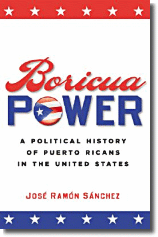
He applied the "Page 99 Test" to his 2007 book Boricua Power: A Political History of Puerto Ricans in the United States, and reported the following:
I grapple with explaining power in this book. How do people get others to do things? Why do others comply? Puerto Ricans are a good case study for these questions because so much research and popular thinking has characterized this Latino community as one of the poorest and weakest in the U.S. I show that, contrary to popular thinking, there have been moments when Puerto Ricans have amassed power. More importantly, I show that these moments cannot be explained by traditional theories of power.Read more about Boricua Power at the NYU Press website.
This chapter analyzes the Puerto Rican experience with power in the post-World War period in New York City. On this page, I remind the reader of the overall theme of the book. I explain power as an unstable product of the interactions between people. Power, in this sense, is less a thing and more a movement. It is a dance, the intersection of people driven by passions and interests with people who have the ability to satisfy them. It is within that engagement or dance that people gain the ability to move and to be moved, to act and to resist, to lead and to follow. Money or weapons, in this sense, do not create power. They can make power possible for those who possess them, but only if other people need or desire money in one or fear injury and death if a weapon is used in the other. Money loses value. Desires differ and change. Some people fear death. Some don’t. These changes and differences shift power, making it fundamentally unstable and fluid.
Though this chapter explains how the Puerto Rican community in New York City was able to gather political power, I suggest on this page that power actually does not exist so neatly compartmentalized into political, economic, and cultural boxes. I write “these dimensions of life are both too tangled together and too omnipresent for one to always dominate. It is the gravity of the relationship at particular moments that gives any of these dimensions the special ability to pull and push bodies across the social plane and expose its power.” Puerto Ricans in the post WW Two era gathered political power but not because they voted or had good political organizations. They simply became more valuable as cheap labor to local New York City industries and important examples of capitalist freedom in the emerging Cold War politics between the U.S. and the U.S.S.R. Changed economic need for Puerto Rican labor and superpower political interests thus created the gravitational forces that resulted in political power for Puerto Ricans in this period.
--Marshal Zeringue



